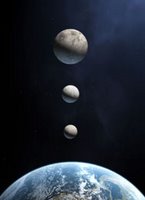Science: our "new" Solar System
 From Science (16 August 2006)
From Science (16 August 2006)Our solar system has at least twelve planets, not nine as asserted in school books all over the world. That is the implication of a draft resolution for the definition of a planet, presented today by the International Astronomical Union (IAU). If the resolution is accepted, the solar system will gain three planets overnight: Ceres, formerly known as the biggest asteroid; Charon, formerly known as the largest satellite of Pluto; and 2003 UB313 (nicknamed Xena), a Pluto-like object that was discovered last year.
After the discovery of Xena, which is slightly larger than Pluto, the IAU asked a special committee to come up with a clear-cut definition of a planet. The committee, chaired by astronomer and historian Owen Gingerich of Harvard University, now proposes to define a planet as a nonstellar spherical body orbiting a star. The object must be large and massive enough to have become spherical under its own gravity. Pluto certainly fits the bill. So do the others.
[...]
The committee also proposes to officially classify Pluto and its large moon Charon as a double planet, because their common center of gravity lies somewhere in the empty space between the two bodies. Consequently, Charon itself must also be a planet, even though it is considerably smaller than our own moon. Jim Christy, who discovered Charon in 1978, says, "Thinking of myself as the discoverer of a planet is a new concept. It would be an honor."
The committee also suggests labels for different types of planets, recommending that those smaller than Mercury could be called "dwarf planets," while the eight big ones (from Mercury through Neptune) might be called "classical planets." Moreover, the small, frozen planets beyond Neptune, which take more than 200 years to orbit the sun, would officially be labeled as "plutons," to set them apart from the big ones.
[...]
Over the next few days, the draft resolution will be discussed and possibly altered at the 26th General Assembly of the IAU in Prague, Czech Republic. On 24 August, some 2500 astronomers from all over the world will be asked to vote "yes" or "no." [...]


0 Comments:
Post a Comment
<< Home